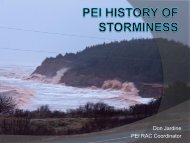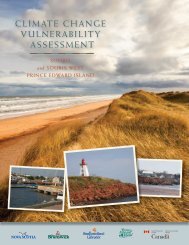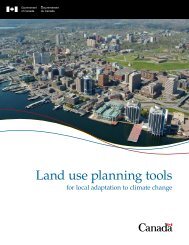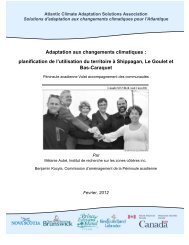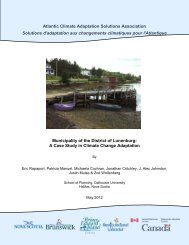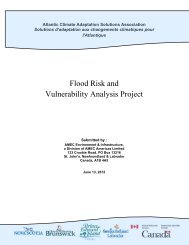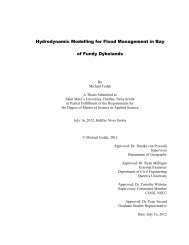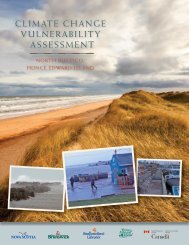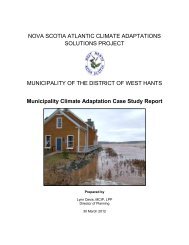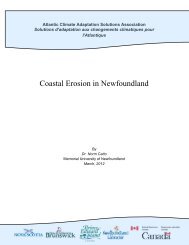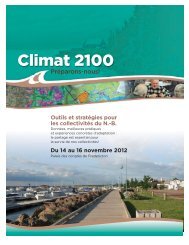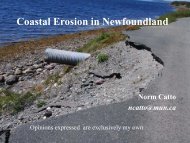Lunenburg Part 2 - Section 5 - Social Vulnerability - August 30.pdf
Lunenburg Part 2 - Section 5 - Social Vulnerability - August 30.pdf
Lunenburg Part 2 - Section 5 - Social Vulnerability - August 30.pdf
You also want an ePaper? Increase the reach of your titles
YUMPU automatically turns print PDFs into web optimized ePapers that Google loves.
Some consultees commented that newcomers are not always well accepted into communities in<br />
the District, describing how people who do not have family connections in the area may be<br />
viewed as outsiders and experience exclusion. This may be surprising to some new residents,<br />
who are not prepared for the physical and social isolation they may experience. One consultee<br />
noted that newcomers who do not belong to a faith group may find it particularly difficult to create<br />
social connections. Another felt that traditional family arrangements are predominant in the<br />
District, and that newcomers who do not conform to established norms may have especial<br />
difficulty finding acceptance.<br />
Low Income & <strong>Social</strong> Assistance<br />
Consultees felt that low-income residents face increased risk from climate change impacts<br />
because of their limited resources. Single parents were identified as a population group likely to<br />
experience low income in addition to the challenge of sole responsibility for family well-being.<br />
Several consultees remarked that when people already can’t afford rent, food, and heat for their<br />
home, they will be unable to invest in emergency supplies or preventative measures to reduce<br />
their physical risk. Individuals struggling to meet the expense of basic needs are unlikely to have<br />
a contingency fund for unexpected expenses in the event of an emergency.<br />
One issue of concern for low income residents is housing. The existing housing stock includes<br />
many old homes, some of which are in poor repair, with leaky roofs and windows, or little to no<br />
insulation; tenants have little control over the maintenance of rental units. Low income residents<br />
may not be able to choose a home in good repair if they are renters, or may be unable to<br />
sufficiently maintain their home, or invest in flood-proofing measures, if they are homeowners.<br />
Consultees noted that there are modest homes in some low-lying areas that have clearly been<br />
flooded in the past; environmental hazards such as mold and mildew, and structural safety are<br />
concerns for these homes and their residents. They expressed concern that lower income<br />
residents might not have flood insurance, and that loss of property value in the case of a flood<br />
could be a serious burden.<br />
Low income individuals without access to a personal vehicle are particularly disadvantaged, due<br />
to the lack of alternative transportation options: travelling to a grocery store in <strong>Lunenburg</strong> or<br />
Bridgewater is challenging, and individuals can only purchase as much as they can carry,<br />
limiting their ability to maintain an emergency supply of food. Those with modest or shared<br />
accommodations might also have limited storage space for food. Low-income individuals who<br />
lack family connections in the area have fewer support networks, and are therefore more<br />
vulnerable than others.<br />
Many residents in the District are somewhat self-sufficient in food, keeping a garden and<br />
perhaps chickens, and canning or freezing foods. However, those without their own property,<br />
access to a yard, storage options, and knowledge of methods for preserving food, do not have<br />
this advantage, and are entirely dependent on the ability to access grocery stores. These<br />
residents may also be less likely to an alternative power source to operative a fridge or freezer in<br />
the event of a power outage. One consultee questioned if support from food banks would be<br />
available to residents in need in the event of a natural hazard; these organizations rely on<br />
volunteers, who might be unable to volunteer if they are dealing with a crisis situation<br />
themselves, or if access routes are disrupted.<br />
Two consultees, both knowledgeable about population health issues, emphasized the<br />
interconnected nature of challenges faced by individuals with low income: poverty is related to<br />
housing, housing is related to food security, food security is related to transportation, and<br />
transportation is related to employment opportunities. These relationships create multiple<br />
68



